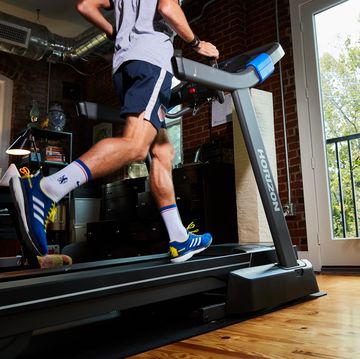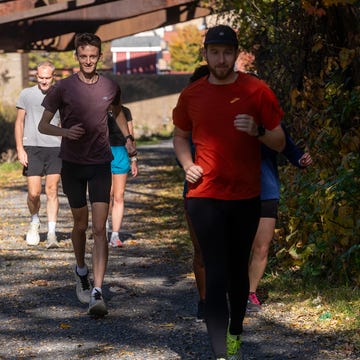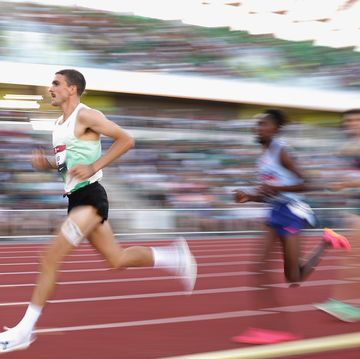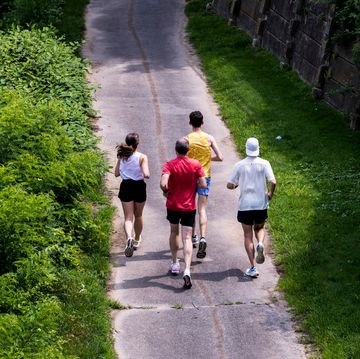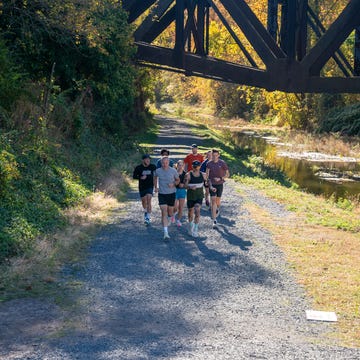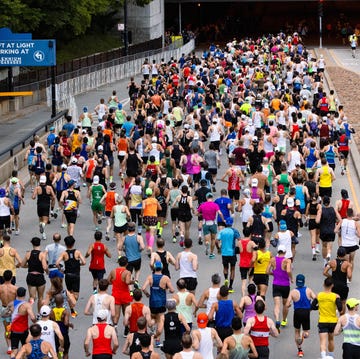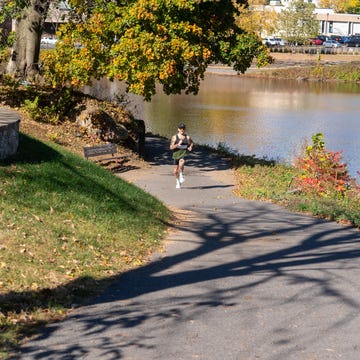When Kara Goucher placed fourth at the 2016 Olympic Marathon Trials—just one place shy of making her third team—her heart was broken. So was her knee. And her immune system.
It took a few years, a couple of surgeries, and a series of allergy tests before she regained enough energy to think about running again. And in the meantime, the Boulder, Colorado-based athlete filled her life with many other interests, like volunteering at her son’s elementary school, hosting retreats for women runners, and even writing a book. Goucher turned 40 in July and wondered if she’d ever feel the urge again to line up for another marathon. For a while she didn’t.
But this fall, Goucher, who is the 2007 world championships silver medalist in the 10,000 meters and has a marathon best of 2:24:52 (Boston, 2011), found herself gradually building mileage each week without illness or injury. The 26.2-mile itch returned, and she announced on Friday that she is competing on January 20, 2019, at the Houston Marathon.
Lets talk about the Houston Marathon. Why did you choose it and what went into that decision San Antonio Rock ’n’ Roll Half Marathon on Sunday, where she placed third in 1:16. Afterward, Goucher spoke with Runner’s World by phone about her hopes for Houston, her projects outside of training, and what she wants to tackle after the marathon is over.
Runner’s World: You were third at the half marathon on Sunday. Did your performance meet your goals? What were you hoping to accomplish at the race?
Kara Goucher: Yes. Actually, my coach [Mark Wetmore] changed the plan on me [Saturday] night. Originally the goal was to come in and run high 75 minutes to 76 minutes, which is my goal pace for the Houston Marathon. But then Mark said he’d like me to run closer to 77-minute pace for eight or nine miles and then have to kick down to 76-minute pace. So that’s what I did. I was sprinting so hard to try to break 76 but it just wasn’t going to happen. I was really happy with it. I think if I hadn’t done it that way, I could have run in the mid-75 range, but it really was about getting in a groove and having to shift gears with three or four miles to go.
Let’s talk about the Houston Marathon. Why did you choose it and what went into that decision?
I just started naturally running more. I had been hurt a lot in the spring and dealing with some personal stuff. I just didn’t feel like running much. But when my son went back to school in August, I started running more since he wasn’t around. Instead of running five miles quickly before [husband] Adam [Goucher] had to go to work, I’d run 12, then maybe I’d run 15, and then the next thing I knew I was running 90 miles a week. I went to my coaches and said, “I’m starting to build a base. I don’t know if it’s realistic but I’m kind of thinking I want to run a marathon again.”
At first we thought about CIM [California International Marathon], but even though I was running a lot of miles, I hadn’t done any actual work. So, I did a workout at what my goal marathon pace would be—between 5:40 and 5:50 [per mile]—and it was impossible. I thought, “Well, 100 miles a week is not the same as marathon fitness.” We decided to focus on Houston, which gives us seven more weeks.
[On the way to that goal, she ran the The Big 7 Body Breakdowns.]
I know you’ve had a number of injuries during the past few years. What were they?
I tore my meniscus leading up to the Olympic track trials [in July 2016] and tried to run through it. I was still in pretty great shape from the Olympic Marathon Trials, but it got to the point that I just couldn’t run on it anymore. I had surgery to clean that up, and then I had another surgery a few weeks later to clean it up more. But during that time I found out that I am missing cartilage on the medial side of my knee, so it had done a lot of damage to the bone from running on it for so long. I had to take five months off running—it was the longest break I’ve ever had. I started running in November or December of 2016 and then I couldn’t get out of this funk of my knee getting really sore or my hip getting really sore.
Then, I just started to feel bad all the time last fall. I went to the doctor and was like, “I think I’m dying. No, really, I think I’m dying.” It turns out I’m severely allergic to dogs. We had adopted a dog a year and a half before. I don’t have the allergy where you have a rash or whatever—it’s attacking my lungs. My lung function was really down. That was a process because I had to go on a bunch of medication to calm my lungs down. We weren’t going to get rid of [our dog] Freya, so I started allergy shots. That was a really long process to get through that, but now I’m doing that once a month for a maintenance dose, so it doesn’t bother me anymore.
Oh no. You’ve always had pets and animals around, haven’t you?
Yes. It was just a lot of weird stuff going on. I grew up with dogs. I’ve had animals my whole life, but I hadn’t lived with a dog since high school. Freya was slowly shutting my lungs down. I was feeling more and more tired and not like myself. But we got it all figured out and I am feeling more like myself, especially this fall.
You went back and forth about whether you had another marathon in you after the Olympic Trials. Now you decided that you do. What are you hoping for out of this one?
After the Olympic Trials I was like, “I can’t ever do this again. I can’t sacrifice and want something so bad.” To run a really good marathon, you have to want it. You have to be vulnerable. After the Trials I was feeling like I was just beyond that in my life now and couldn’t put myself in that position anymore. Also, I was chronically injured or sick. The thought of running the marathon was hard to even think about, but I wanted to do something. I didn’t know what that would be. Maybe a half marathon at some point? Or maybe just run on the roads for fun? I just didn’t know.
But this fall when I started to get my mileage up, I got the itch to get back out there. It’s not for anyone but myself. I’m not trying to prove anything or prove I can make a team in 2020. I’m not interested in that. It’s just for me. I’d love to run around 2:32.
Now that you’ve turned 40, how are you approaching training? Do you feel any difference this time around?
I don’t have recovery skills or the speed I had before, so it’s been important to work on my speed a little bit. Somebody just asked me if I’m focusing on miles or Ks [kilometers] and I said, “No—like, 200s.” It’s been fun. Typically I do something hard on Wednesday, like a fartlek, though now moving forward Wednesdays will be pace-focused. Friday I do something really short, like a five- or six-mile warm up, then 200s or 300s, and then a long cool down. Sundays I do my long run. The rest of the days is just mileage and recovery. I do like big mileage, but I can’t do the 115-120 per week like I used to. Now it’s more like 105-110.
And now that your son, Colt, is a little older and probably getting into more activities, do you frame your training any differently than you did before?
Running is so important to me for my sanity, but the workout and race portion of it is secondary now. I do the bulk of my training right after I take Colt to school. I double [run twice a day] five times a week, but I’ll either do it quickly before he gets home or when he’s at a lesson or something.
When I was training for the Trials and trying to make an Olympic team, it was very different. Somebody else would pick him up or take him to daycare so that I could nap and do all these things. Now it’s really fitting in the training where I can, though that doesn’t mean that I’m not working hard. I’m definitely working hard, but it comes behind other things. I volunteer at his school and I’m not going to stop doing that—it’s something I love and enjoy. Four years ago, I would have stopped. I would have been napping. It’s just really different. I still really love it and I’m in a happy place with training, but it’s definitely secondary to all the other things in my life that I explored when I couldn’t run anymore.
What do you do at school when you’re volunteering?
I take them to the library and help them work on their journals. It’s fun and interesting what second graders want to write about. One time Colt wrote something like, “My mom is really nice and she has a chocolate addiction. She eats it every day.” They’re allowed to write about whatever they want—sometimes it’s sports or family. They have a lot of pretty funny things that come out in the journal.
In the past couple of years you’ve taken up a lot of projects outside of training for races, like your new book Strong, various camps, and other interests. How do these interests fortify your life in ways that running can’t?
When I couldn’t run for those five months, I knew I needed something more in my life. Running is my vehicle and the thing I love so much. How do I do more in my life around running when I can’t physically run or race anymore? The book came from that, and I’m starting my first girls’ camp the week after Houston, which I’m really excited about.
I know youve had a number of injuries during the past few years. What were they, it fills my soul. I get to pass on my love of running, I get to interact with some really cool and appreciative people and they give so much back to me. It has been really healing. If I never race again, I can exist in this world of running where I really feel fulfilled. I don’t have to race to feel fulfilled anymore.
I’ve really been shocked at the support after I said I’m running Houston. I am going to run a lot slower than I used to run, but people have been so kind and encouraging. It reminds me of how awesome the running community is.
What do you have planned for the girls’ camp? That’s a new age group you’re reaching out to, isn’t it?
It’s the first one. It’s just going to be a day camp. My ultimate goal would be to travel it to Minnesota or the East Coast or the West Coast. We’ll be running a little and talking about injury prevention, talking a lot about mental health, confidence building, and we’ll do some self defense. Really it’s just an opportunity for girls to let their guards down and learn a little bit.
When I was in high school I had so much self-doubt and anxiety. I wish somebody had told me that was normal and that we could work through it together. I’m planning a day of what I wish somebody had done for me when I was younger.
You’ve also kicked the idea around of racing on the trails and trying ultra distances. Is that something you’re still considering?
Oh definitely, yeah. This marathon is for me and we’ll see how it goes. Maybe if I surprise myself and run faster, maybe I’ll want to do one more, but I feel like the trails are calling my name. It’s something different. Now I’ve been encouraged that I can handle some big miles and stay healthy. It makes me feel like I can run on the trails even though the training will be more challenging on my knee. I can probably run a little less on the trails, but it’ll be harder. But I’m definitely interested and excited about that. Depending on how the race in Houston goes, I have some plans. But we’ll wait until after Houston and see what happens.






